This is the first in an occasional series of interviews with California business leaders.
When it comes to shaping the conversation about business in Southern California, few people wield as much influence as Charles Crumpley. As editor of the Los Angeles Business Journal, Crumpley oversees one of the more impressive news operations in the region, garnering numerous awards for the publication during his eight-year tenure. And while the Business Journal is very much a tribune for conventional ideas about business and the economy, Crumpley has been remarkably open-minded about printing other perspectives, including those of activists with a sharp critique of corporate America.
Capital & Main sat down with Crumpley, whose 30-year journalism career has included stints in Kansas City and New Orleans, in the Business Journal‘s Miracle Mile offices to discuss economic inequality,
» Read more about: A Talk With the L.A. Business Journal’s Charles Crumpley »

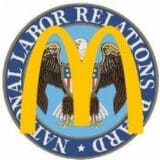
The charges against several McDonald’s franchises were as familiar as items on a Happy Meals menu: “illegally firing, threatening or otherwise penalizing workers for their pro-labor activities,” to quote the New York Times. What was novel about them was the news, first reported Tuesday by Associated Press, that the National Labor Relations Board’s general counsel had found that the fast-food giant is responsible for these crimes when they are committed by the chain’s individual franchise owners. (Of 181 cases that came before the NLRB, 43 were found to have merit, 64 are still pending investigation and the rest were dismissed.)
This is big – very big. If there is any doubt, look no further than the Wall Street Journal’s headline for the story: McDonald’s Ruling Sets Ominous Tone for Franchisers. The reason for this “ominous” forecast is the knowledge that the NLRB’s findings could establish the principle that the corporation and the chain’s franchise owners are “joint employers,” sharing equal responsibility for their employees’ welfare – and equal blame when workers’ rights are trampled on.
» Read more about: NLRB: McDonald’s Is Responsible for Franchises’ Behavior »

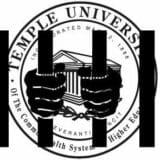
Whenever I hear something that sounds a little fishy, I always follow my mom’s advice to consider the source. So when two professors from Temple University touted a study praising the quality and cost effectiveness of private prisons, advocates wanted to know who funded it. Not surprisingly, it turned out that the private prison industry paid for the study, a fact conveniently missing from the professors’ early draft and media appearances.
In the Public Interest’s friend and colleague Alex Friedmann, managing editor of the monthly Prison Legal News and associate director of the Human Rights Defense Center, filed an ethics complaint with Temple University. In addition, ITPI and 15 other organizations demanded that Temple conduct an ethics review.
In response, Temple University has disassociated itself from the study. In addition, the methodology behind the study has also been called out for being misleading and its conclusions for being inaccurate.


I have a friend who is intelligent, thoughtful and holds a responsible position in a major firm. From time to time we exchange ideas about the condition of American society, particularly how the economy shapes our democracy these days. We often agree about the dimensions of the problem, but disagree about what should be done about it. When it comes to the inheritance tax, we stand at opposite poles.
He thinks that what a person has accumulated in their lives is theirs to do with as they please, period. If they want to hide it offshore in the Virgin Islands, fine. If they want to give it all away, fine. And if they want to just pass it along to their children, no problem. As far as he is concerned the 400 who own as much as half the American population can do whatever they want – it’s their money.
I’ve always thought the opposite.
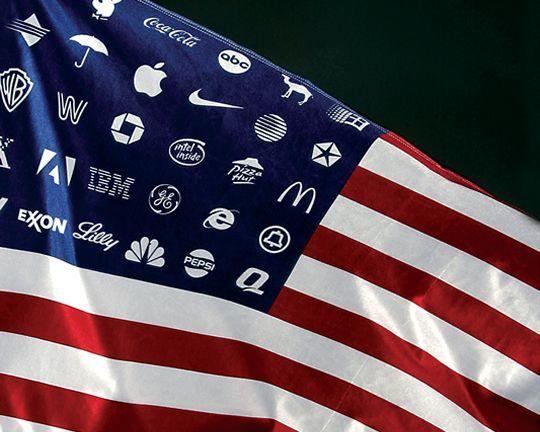

Some of us, who as kids read Edward Everett Hale’s short story, “The Man Without a Country,” might wonder if its cautionary lesson about the dangers of renouncing citizenship could be applied to American corporations. They, after all, have been declared “people” by the Supreme Court – and so if companies, like the Army officer in Hale’s story, turn their backs on their country, do they lose their right to ever set foot on its soil again?
The question begs an answer as the new corporate fad of “inversion” takes off. This is the practice of an American corporation purchasing a smaller foreign one that makes the same products in order to claim the national “citizenship” of the purchased company. By doing so, the U.S. company dodges a tax bill from Uncle Sam without its CEO having to learn a single word of the language of his or her company’s adopted country.
» Read more about: Corporations Avoid Taxes With Inversion Scam »
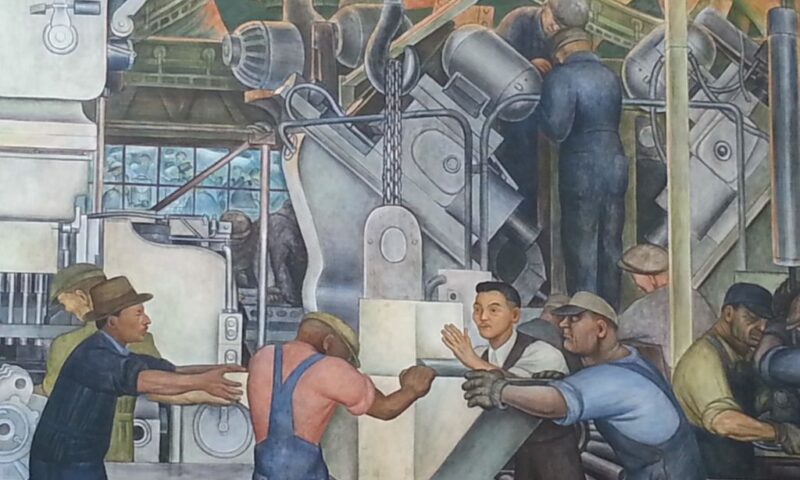
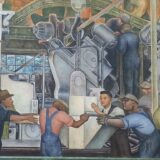
It was an incredibly busy and rewarding time last week at Netroots Nation in Detroit. Sifting mentally through the countless conversations, workshops, speeches, text messages, Tweets, business cards and campaign “swag” I’ve accumulated, I struggled to find a common thread.
Then I visited the Detroit Industry Murals — one of Diego Rivera’s most famous works of art. Rivera’s amazing fresco murals reflect ideas of duality: contrasting managers and workers, mechanized industry and the natural world, and the positive and destructive potential of science and technology. Rivera beautifully illustrated these concepts between 1932 and 1933 by painting images of biochemical weapons and passenger planes, female fertility figures with South and North American characteristics, doves and hawks, orderly production lines and fiery furnaces.
Then, it clicked. For me, Netroots Nation 2014 has been about the duality of art and war.
» Read more about: Netroots Nation in Detroit: The Art of War and the War of Art »
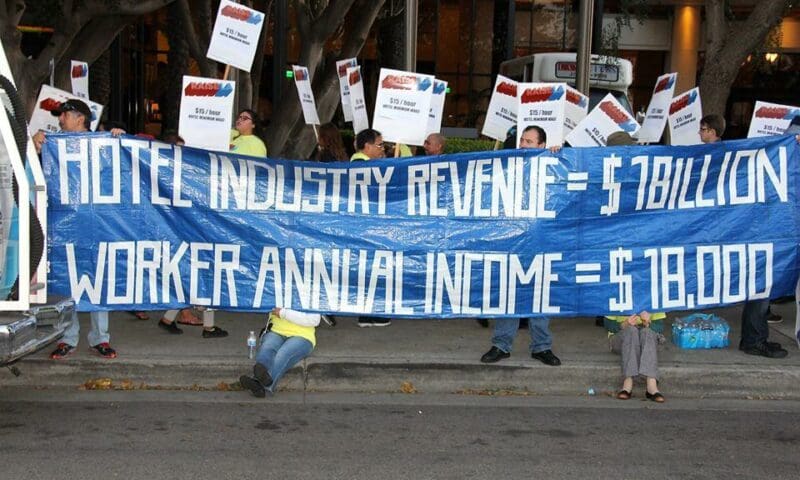
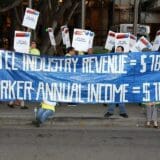
When asked by the Los Angeles Times to explain the movement to raise the minimum wage for the city’s hotel workers, one worker said, “At $15 [an hour], we can make it. We can live just a little bit better, not drowning all the time.”
It’s no surprise that hotel workers would be in favor of having raising their hourly minimum wage raised from $9 to $15.37, as is currently being proposed. Nor is it surprising that they’ve found support from the extensive network of liberal organizations and labor unions in the L.A. area. Less predictably, however, many members of L.A.’s business community, ranging from 750 small business owners to shopping mall developers Rick Caruso and the Westfield Group, have endorsed the proposed legislation as well.
In a letter to Councilmember Mike Bonin, Westfield co-CEO Peter Lowy indicated his organization’s support for such a measure. Lowy described Westfield’s experience with the living wage requirements currently in place at Los Angeles International Airport and said that “the continued growth and prosperity of this City is vital not only to [Westfield’s] centers,
» Read more about: L.A. Hotel Workers Move Closer to $15.37 Hourly Minimum Wage »


I wasn’t sure what to expect when arriving in Detroit, Michigan Wednesday. The city is heavy with symbolism in the American imagination – everything from Motor City and Motown to Broken Dreams and Bankruptcy. A recent article called Detroit “a mixed picture of hope and desolation.” Which side would reveal itself to me?
I craned my neck as the taxi cab sped along a highway. At first, I saw nothing special: clouds low and gray in the sky, SUVs on the road, overpasses and underpasses, and the occasional warehouse or big-box store.
And then I saw them: large, four- or five-bedroom, brick or wood houses alongside the highway. Every house was boarded up, caving in, spray-painted, overgrown with vines, or blackened with fire scars. The cab driver spoke angrily. “See those homes? It’s not safe there — looting and shooting. Do you see those homes?”
I did see them.
» Read more about: Coming Home to Detroit for Netroots Nation »
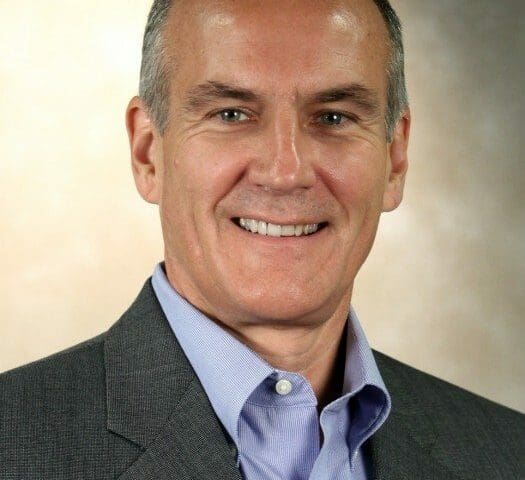

With his pressed jeans, vegan diet and runner’s frame, Jeff Farmer could be a high-tech entrepreneur. But his heart is with low-wage parking attendants, taxi drivers and truckers instead of corporate profits.
As the International Brotherhood of Teamsters’ national organizing director, Farmer doesn’t mind that his union has a reputation for being the biggest and baddest kid on the block. Farmer says that when workers organize they want to know they have an even chance to win against the abuses of some of the biggest international companies out there. With a good strategic organizing plan and by bringing the right people together, Farmer feels they can. Fresh from a five-day trucker strike at the Port of L.A. that was launched to win basic employee rights, the Teamsters are putting this approach into practice.
True to his roots as an organizer, Farmer believes unions have to be open to new relationships and ways of organizing.
One hundred twenty port truck drivers, responding to a mediation initiative from Los Angeles Mayor Eric Garcetti, agreed to end their strike Friday evening and are returning to work today. The Unfair Labor Practice walkout, which had no fixed end date, began June 7 against three harbor trucking companies (Green Fleet Systems, Total Transportation Services Inc. and Pacific 9 Transportation) that port haulers allege commit wage theft, engage in workplace retaliation for union organizing and misclassify their drivers as “independent contractors” rather than company employees.
The five-day strike was unprecedented for its length – and for the bad publicity it splashed on the three companies, which have also been on the losing end of a string of labor court and National Labor Relations Board rulings regarding their treatment of truck drivers. The strike saw the brief shutdown of several marine terminals, an impromptu concert for the strikers by protest rocker Tom Morello and a secondary protest in Manhattan Beach aimed at the Skechers shoe company,
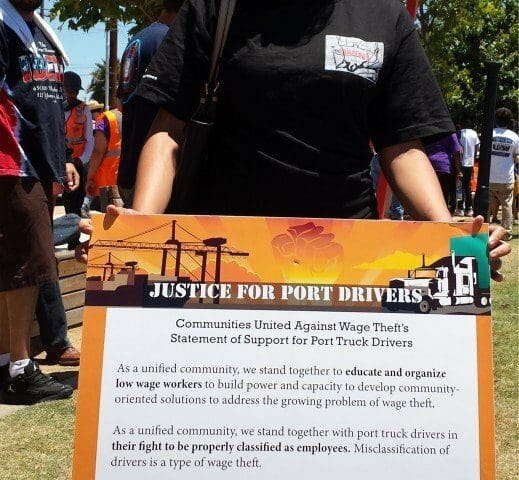
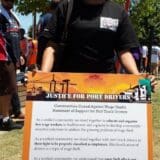
Friday ended an historic chapter in the life of the Los Angeles-Long Beach waterfront as 120 truck drivers toughed out a weeklong Unfair Labor Practice strike. The work stoppage was aimed at three companies (Green Fleet Systems, Total Transportation Services Inc. and Pacific 9 Transportation) that port haulers allege commit wage theft, engage in workplace retaliation for union organizing and misclassify their drivers as “independent contractors” rather than company employees. Such a distinction allows the firms to treat their workers as second-class citizens and to avoid contributing payroll taxes to the state and federal governments.
With no end of the strike in sight, the week nevertheless drew to a close on a celebratory note, as seen in these photographs. A rally attended by the drivers and their supporters was held outside the Terminal Island facility of Yusen Terminals, where a cumbia band, Los Jornaleros del Norte, underscored the crowd’s high spirits.
» Read more about: Scenes From the Port Truck Driver Strike: An Historic Week Ends »
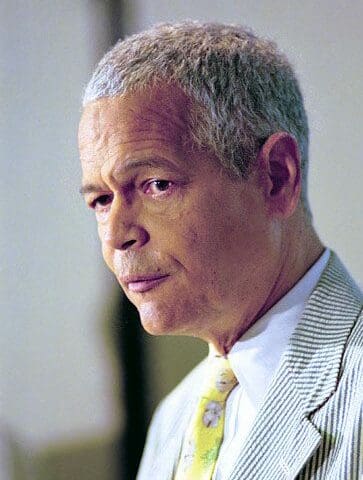
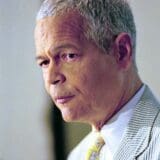
Last month Julian Bond, the pioneering civil rights activist and former Georgia state legislator, addressed an audience gathered in Jackson, Mississippi, to celebrate and analyze the Mississippi Freedom Summer of 1964. Bond’s speech appears for the first time here, with his permission.
In 1961, when Martin Luther King Jr. addressed the Fourth Constitutional Convention of the AFL-CIO, he spoke of the “unity of purpose” between the labor movement and the movement for civil rights. He said:
[tabs type=[tab_title][tab]“Our needs are identical with labor’s needs: decent wages, fair working conditions, livable housing, old age security, health and welfare measures, conditions in which families can grow, have education for their children and respect in the community. That is why Negroes support labor’s demands and fight laws which curb labor. That is why the labor-hater and labor-baiter is virtually always a twin-headed creature spewing anti-Negro epithets from one mouth and anti-labor propaganda from the other mouth. » Read more about: Exclusive: Julian Bond on Labor and Civil Rights »
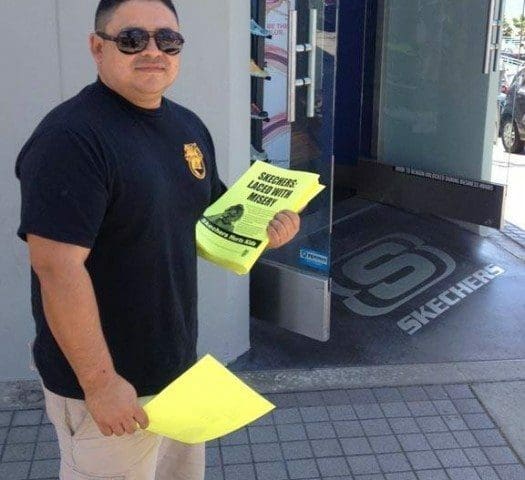

Throughout the course of the L.A./Long Beach port driver strike, Capital & Main will be running photos from the marine terminals and truck yards where drivers and their supporters have gathered.
One hundred twenty truck drivers who haul freight to and from the twin ports of Los Angeles and Long Beach went on an Unfair Labor Practice strike Monday against the three companies they work for. The work stoppage, which has no announced end date, was called to protest alleged retaliation by Green Fleet Systems, Total Transportation Services Inc. and Pacific 9 Transportation, as well as the drivers’ long hours and low wages. Perhaps more important, the strikers are motivated by their determination to end the companies’ practice of classifying drivers as “independent contractors” – a status that allows the firms to treat their workers as second-class citizens and to avoid contributing payroll taxes to the state and federal governments.
» Read more about: Scenes From the Port Truck Driver Strike: Skechers on the Hot Seat »
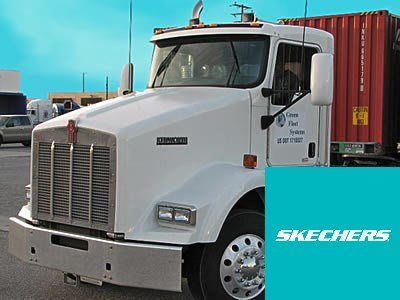

If you’re wondering what all the fuss is about down at the ports of L.A. and Long Beach, where drivers have been on an Unfair Labor Practice strike since Monday, think Nike during the 1990s. Remember the barrage of news stories and reports about the horrendous conditions endured by workers at plants run by Nike contractors? Remember how the company tried for years to distance itself from the practice of its contractors, even though it had the power all along to put an end to the exploitation?
The same story is unfolding right now in Southern California, where multinational retailers are refusing to take responsibility for the egregious abuses of their contractors. A case in point is Skechers, which recently supplanted New Balance as the nation’s fifth-largest athletic footwear brand.
Based in Manhattan Beach, Skechers is experiencing enormous growth in sales and profits. In the first quarter of 2014,
» Read more about: Skechers’ Labor Troubles: A Nike for the 21st Century »
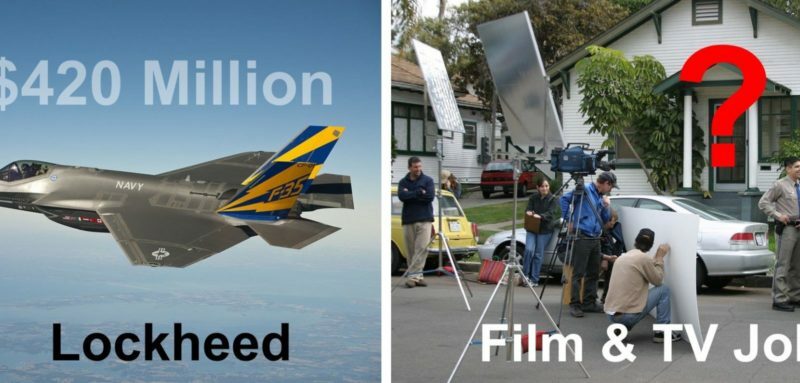

California Tax Breaks — What’s Wrong With This Picture?
Amid continued squabbling over whether to boost the California film and television production tax incentive program, the state legislature just handed aerospace giant Lockheed Martin Corp. a whopping $420-million tax break.
Yes, you read that right: A bill creating a 15-year sweetheart deal — for a single private company — sails through the Assembly and Senate without a hitch, yet the fate of Assembly Bill 1839, which would enhance California’s existing entertainment tax credit program and generate millions in additional revenue, continues to face opposition in Sacramento.
What’s wrong with this picture?
It should be a no-brainer that, in order to remain competitive in the global market for film and television production and post-production work, California needs to boost its incentive program. Once the epicenter for entertainment production, California no longer assumes this leadership position.
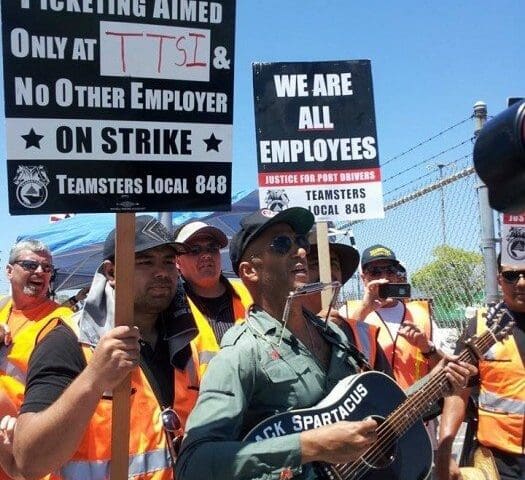
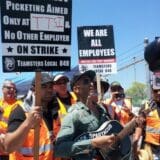
One hundred twenty truck drivers who haul freight to and from the twin ports of Los Angeles and Long Beach went on strike Monday against the three companies they work for. The work stoppage, which has no announced end date, was called to protest alleged retaliation by Green Fleet Systems, Total Transportation Services Inc. and Pacific 9 Transportation, as well as the drivers’ long hours and low wages. Perhaps more important, the strikers are motivated by their determination to end the companies’ practice of classifying drivers as “independent contractors” – a status that allows the firms to treat their workers as second-class citizens and to avoid contributing payroll taxes to the state and federal governments.
On Wednesday rock-and-protest icon Tom Morello showed up on Terminal Island to support the strikers. The Rage Against the Machine guitarist and Watchman singer strummed a guitar labeled “Black Spartacus”
» Read more about: Scenes From the Port Truck Driver Strike: Tom Morello Performs »
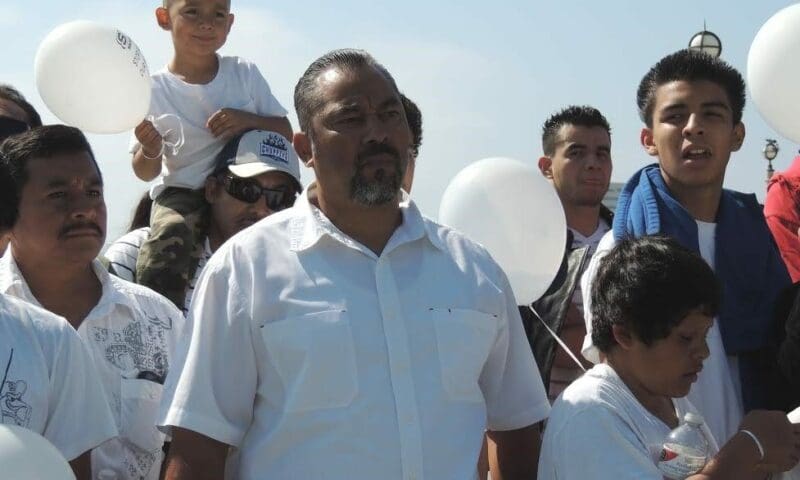

Byron Contreras has seen almost everything in his 15 years as a truck driver, but there’s one thing he’s still looking for – respect.
That word comes up repeatedly in a conversation with Contreras, an employee of Green Fleet Systems who, along with 120 other drivers, walked off the job Monday, slowing down operations at the nation’s largest port complex. The drivers and a small army of supporters have been picketing the yards of Green Fleet, Total Transportation Services Inc. and Pacific 9 Transportation, as well as marine terminals at the Ports of L.A. and Long Beach.
The strike – the fourth one in the last year involving local port truck drivers – comes as the port trucking industry continues to reel from a string of devastating decisions by courts and government agencies. These rulings have confirmed what critics have been saying for years – that the mistreatment of truck drivers is not only immoral,
» Read more about: Wheel Man: Interview With a Striking Port Truck Driver »
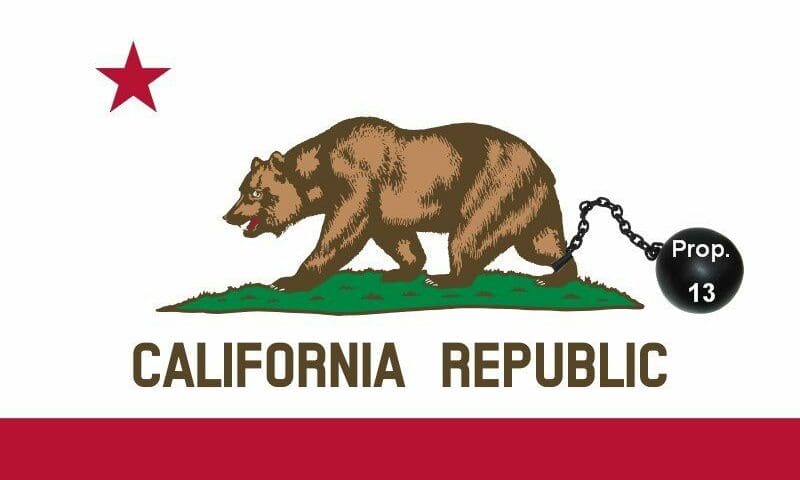
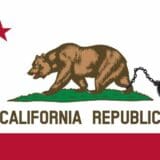
Who ate the California Dream? Why is the state that once led the nation in education now at the bottom? Why is the state that pioneered infrastructure miracles at war over building a bullet train or shoring up the levees in the Sacramento/San Joaquin River Delta? Why has our state been a fiscal shambles for most of the past dozen years? What brought our Golden State to its knees?
Some might conjecture about the focus on prison construction that dominated a couple of decades of state budgets or the Great Recession’s deficit years. Some people blame public sector unions and their members’ retirement funds. But to really understand what happened to California, you have to go back further, to 1978 and the passage of Proposition 13.
Oops, we just touched the “third rail” of state politics, so let me offer this caveat. The residential property tax limits installed by the passage of Prop.
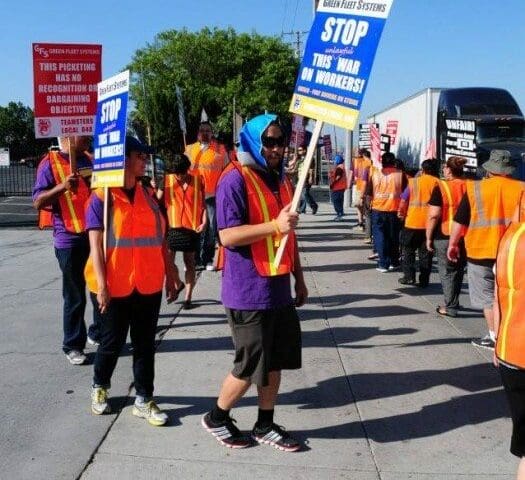
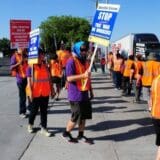
One hundred twenty truck drivers who haul freight to and from the twin ports of Los Angeles and Long Beach went on strike Monday against the three companies they work for. The work stoppage, which has no announced end date, was called to protest alleged retaliation by Green Fleet Systems, Total Transportation Services Inc. and Pacific 9 Transportation, as well as the drivers’ long hours and low wages. Perhaps more important, the strikers are motivated by their determination to end the companies’ practice of classifying drivers as “independent contractors” – a status that allows the firms to treat their workers as second-class citizens and to avoid contributing payroll taxes to the state and federal governments.
Today workers at the Port of Savannah, Georgia also threw up picket lines to protest similar treatment by local trucking companies. According to WJCL TV, Teamsters Local Union 728 “has called on the Georgia Ports Authority to come out publicly condemning the classification of port truck drivers as contract employees rather than full-time.”
» Read more about: Scenes From the Port Truck Driver Strike »
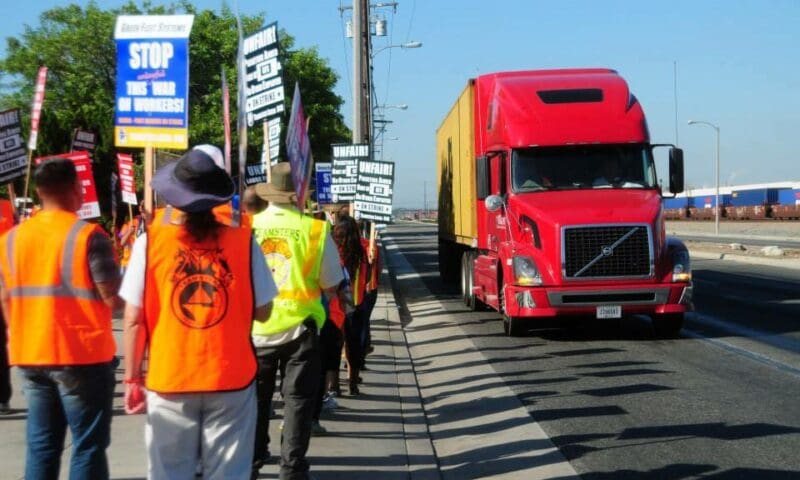
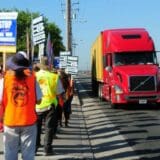
For the fourth time within the past year, port truck drivers have struck short-distance hauling companies over a list of unfair labor practices that include low pay and the endemic misclassification of drivers as “independent contractors.” Misclassification has condemned drayage employees who work at the Ports of Los Angeles and Long Beach to a status of modern serfdom. Port drivers often work 16 hours a day and are financially responsible for the fueling and upkeep of their high-maintenance vehicles – yet their take-home checks can amount to less than minimum wage, thanks to company deductions that charge drivers for everything from gas to insurance.
The strike began early Monday, when drivers who work for Green Fleet Systems (GFS), Total Transportation Services, Inc. (TTSI) and Pacific 9 Transportation (Pac 9) began picketing the companies’ truck yards, as well as the marine terminals of the two giant ports, which receive 40 percent of the nation’s imports.